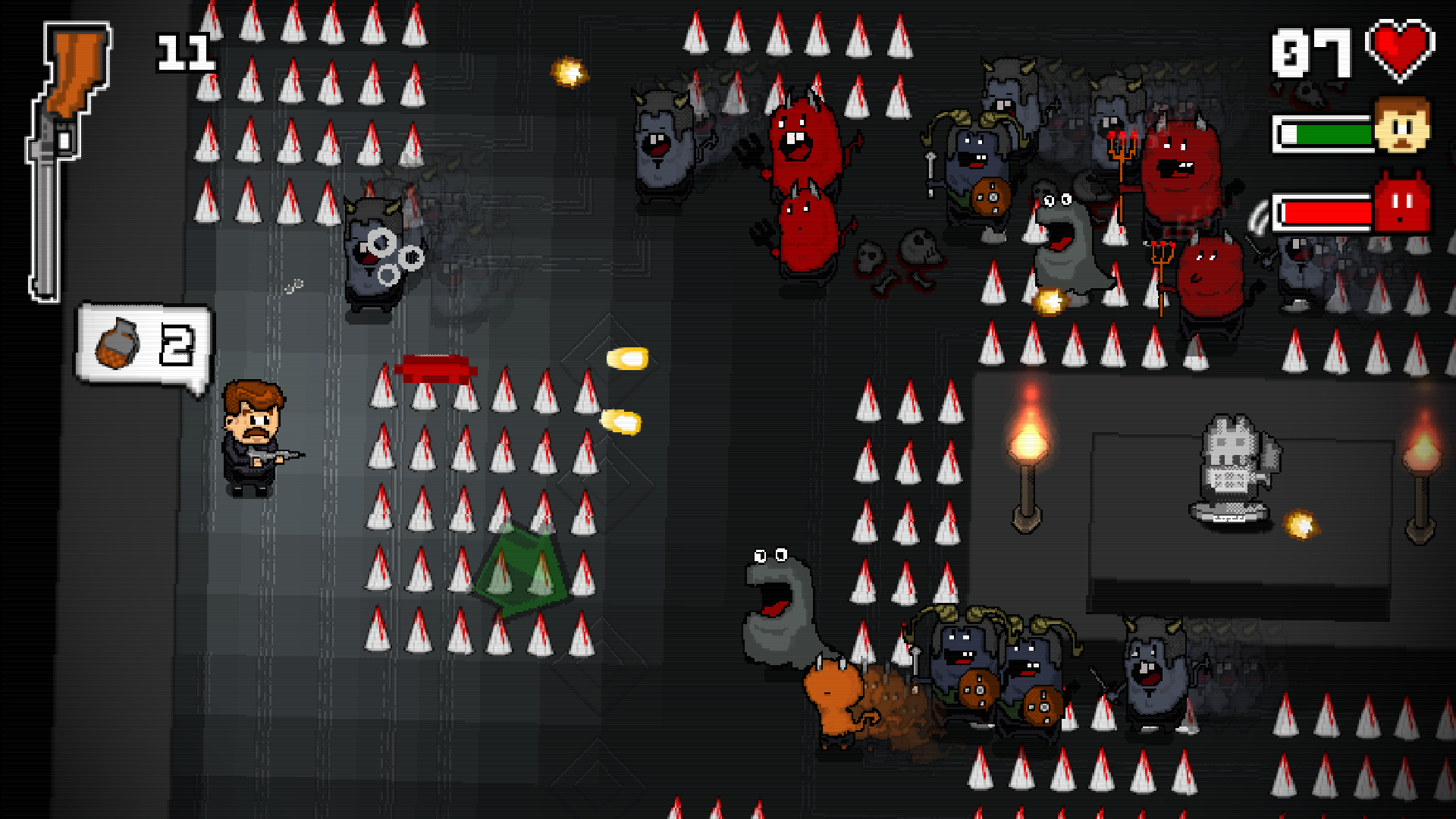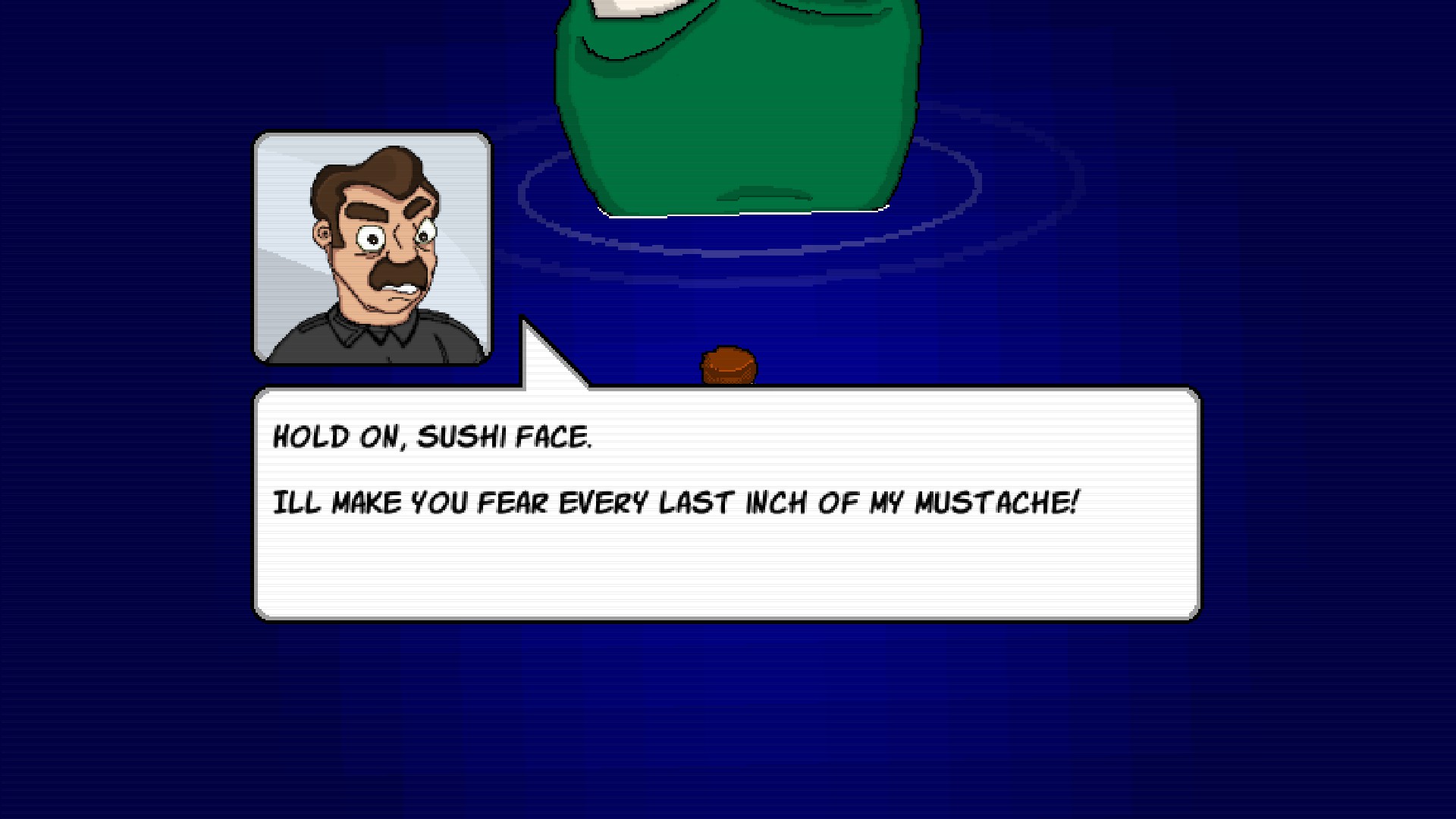Search
[{{{type}}}] {{{reason}}}
{{/data.error.root_cause}}{{{_source.title}}} {{#_source.showPrice}} {{{_source.displayPrice}}} {{/_source.showPrice}}
{{#_source.showLink}} {{/_source.showLink}} {{#_source.showDate}}{{{_source.displayDate}}}
{{/_source.showDate}}{{{_source.description}}}
{{#_source.additionalInfo}}{{#_source.additionalFields}} {{#title}} {{{label}}}: {{{title}}} {{/title}} {{/_source.additionalFields}}
{{/_source.additionalInfo}}Mustache in Hell (PC)

Mustache in Hell
Developed By: IdunaSoft
Published By: Black Shell Media
Released: July 28, 2016
Available On: Windows
Genre: Twin-stick shooter
ESRB Rating: N/A
Number of Players: 1
Price: $4.99
*Advertising disclosure* Though Black Shell Media was a former advertising partner, this review is not influenced by that relationship.
Thanks to Black Shell Media for the review key!
Officer John Mustache wakes up one morning to a few strange, out-of-place occurrences. Everything’s wobbling – well, that’s happened plenty of times before, including the previous night. The stairs directly in front of his bed – that’s definitely new. The Grim Reaper at the bottom of said stairs - looks kind of like his old boss, but novel aside from that. The Reaper announces that John’s almost dead but not quite alive, and thus the perfect candidate to lead a one-man attack on Charon, the former Styx boatman who stole five cubes of power and took over Hell. It's a step up from the mean streets, but let’s just say Officer Mustache is a good enough cop and a bad enough dude to storm the underworld alone.
Mustache in Hell is a fairly standard twin-stick shooter: you fend off hordes of enemies at first with a nigh-useless pistol, with more effective but temporary weapons spawning in at semi-regular intervals. Officer Mustache has access to primary and secondary weapons: the former includes Uzis, shotguns, flamethrowers and machine guns; the latter alternates between grenades and proximity mines. There is a decent variety of enemies, though most charge you and take swings in melee range – a few bigger enemies can dash, a select few spit slow-moving bullets, and mini- and full-fledged bosses have a wider variety of deadlier attacks.

Strong Points: Smooth controls and framerate; good music
Weak Points: Iffy game design; questionable graphics
Moral Warnings: Demons galore to shoot; enemies leave skeletons and bloodstains on death; language (hell, *ss, d*mn); beer as a recovery item
Structurally, the game is sound. The controls, though unbindable, are simple and easy to pick up – the only real hiccup is binding Mustache’s quick, short-ranged dodge move to double-clicking on mouse and keyboard controls, but it works naturally once you get used to it. The framerate is a constant sixty frames per second, even with dozens of enemies and bullets on-screen. The controls, both keyboard and gamepad, respond instantly. The levels form somewhat of a maze interspersed with locked doors, with keys, health items, extra lives, and the odd secret area hidden in between combat rooms. This adds a nice pacing to the intense action that makes up the majority of the game, and lets you restock and get your bearings freely.
Gameplay-wise, however, it’s a mixed bag. The aforementioned weapons and dashing are all you get for the entire game, with the flamethrower and machine gun limited to later levels. The enemies stay mostly the same, but the big demons can charge at you from across the screen and almost always catch you, even if you dash away. Minibosses are equally quick and nasty, especially when paired with the relentless hordes of normal enemies – most rooms have a set number of demons in them, but a few will continuously spawn them until you beat the boss. The end bosses actually have some good design to them, with tricky but avoidable attacks and more limited monster spawns than the minibosses. With Mustache’s dash being rather short and with a second or so of downtime, and with the weapon crates having oddly strict hitboxes, you often do not have the tools necessary to defend yourself. Once the environmental hazards start appearing – retractable spike floors, sawblades, falling rocks, etc. – you’ll find your life bar diminishing rapidly with little you can do.
What exacerbates the issue is that the game seems to recognize its occasionally-unfair difficulty by throwing extra lives at you – you start each of the five levels with five lives, and can hold up to ten. It’s enough to keep you from facing a game over with competent play, but it’s a shortcut approach to game design: rather than ease up on the enemies or give you more defensive tools, they just toss enough lives at you to finish the game. The biggest example of cut gameplay corners lies at the end of every enemy room, where control is taken from you to display some sort of generic one-liner on-screen for a few moments. When it does give you control back, you could very well find yourself standing inside a trap, which can and will kill you after the fight is over. Traps don’t deactivate until you get the key that spawns after every fight, and even then only when they’re scrolled off-screen. It’s more than a little annoying to survive a fight with next to no health, only for a roaming sawblade to finish you off while you’re stuck in place.

Higher is better
(10/10 is perfect)
Game Score - 66%
Gameplay - 10/20
Graphics - 5/10
Sound - 8/10
Stability - 5/5
Controls - 5/5
Morality Score - 72%
Violence - 4/10
Language - 6.5/10
Sexual Content - 10/10
Occult/Supernatural - 7/10
Cultural/Moral/Ethical - 8.5/10
The overall presentation is mixed, as well. Mustache himself looks decent, the environments are nice enough, and there’s this subtle but noticeable swaying of the screen that adds atmosphere but doesn’t distract from the game itself. The music is surprisingly good – there’s not much of it, but its tense yet energetic exploration themes and high-energy combat rock are pleasing to listen to. The sound effects do their job, with the weapons having appropriate punch, though the standard irritating warning beep when you’re below half health rears its ugly head here. Most of the art, however, looks iffy, both in the in-game sprites and in the close-up text boxes. The dialogue is written likely by someone for whom English is a second language, but it’s understandable and ultimately unimportant – the broken English and questionable art almost give off a kind of deranged charm. Considering Mustache in Hell was made by one person, outside of the music and promotional art, it deserves some leeway.
As if the name of the game wasn’t enough of a clue, Mustache in Hell has some moral issues to talk about. There’s demons aplenty to shoot, and they leave behind blood and bones on death – Officer Mustache just sort of dissipates and floats upward as a ghostly angel when he’s killed. Despite being in Hell, there are no occult symbols to find. You’re technically working with the Grim Reaper to get your life back, but it’s stated that Charon would take the fight to Earth and Heaven. There are your stereotypical 1980s police movie quips, containing semi-uncommon PG-13 language, but none of the heavier words. Finally, one of the health items is a mug of beer, and Mustache is a rather heavy smoker and drinker – though the Reaper mentions it’s why he’s in this half-dead state to begin with.
Mustache in Hell is, ultimately, rather average; while its code is solid, its game design leaves something to be desired. It’s rather short as well: you’ll be able to tour the whole game in just over two hours, though some of the optional achievements – beating levels without dying and defeating bosses without getting hit – will certainly take some time if you’re up for it. The $4.99 asking price is rather steep for what you get, however; outside of a sale or price drop, your twin-stick shooter itch would be better scratched elsewhere.
-Cadogan






